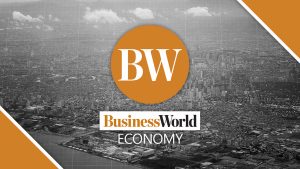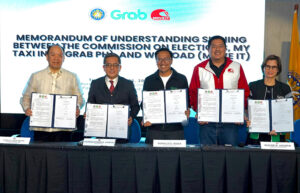Hopeless?

“We’re doomed,” one economist friend remarked on social media — half in jest, I guess — as the latest Functional Literacy, Education, and Mass Media Survey results hit the headlines as this month began.
News of dismal “functional literacy” (metrics included reading comprehension starting 2023) among many senior high school grads have added to those baring two-decade-high self-rated poverty and multi-year-high involuntary hunger readings to cloud our development picture.
Connecting the dots formed by all these — and other — disparate indicators leaves one with a sinking feeling. This despite an otherwise rosy picture painted by some officials, e.g., that we are still expected to be among the fastest growing economies, GDP-wise, despite tempered projections; that we are less exposed than neighbors to external economic shocks; that we still have among the lowest “reciprocal” US tariff rates in Asia; that we should be able leverage our inherent strategic value as we talk trade with Washington, etc.
For the quality of our human resource hits the very core of our development prospects, i.e., one cannot expect an economy to perform well if it will be driven by a new generation of workers struggling with poor nutrition and shallow education among many of them.
These indicators are significant not only for what they, per se, could mean for our economy, but also for what they imply — that they result from wrong policies or poor policy/program implementation.
BATTLEGROUNDSThat, in turn, brings us to the quality of those chosen to make our laws and policies, and, thus, to another election exercise that will take place in five days. I won’t comment on the quality of those running for posts — there have been enough of those remarks making the rounds these days — nor on the frustration some may feel about voters who seem to keep basing their choices largely/exclusively on name recall.
We cannot have enough efforts of groups like the National Citizens’ Movement for Free Elections (NAMFREL) and the Parish Pastoral Council for Responsible Voting (PPCRV) to inform voters — particularly where poverty is most prevalent — about their responsibilities, the qualities of candidates best suited to fill elective posts, and ways to call them to account for their actions.
“If your life was not improved by the person you keep voting into office, why not try someone else?” is one message such groups have been telling their audience for quite some time now.
I just wonder when we will see some sign that voter education has been making inroads in terms of quality of those voted into office. Any perceptible change in voter behavior will take generations to manifest, for sure, hence, NAMFREL, PPCRV and other reformers are in this fight for the long haul.
At the same time, banish the thought that the problem here lies in lack of education. PPCRV Spokesperson Ana de Villa Singson said recently on the ABS-CBN News Channel that the P1,000-P2,000 some voters may be bribed with pales in comparison to the tens to hundreds of thousands of pesos returned by honest janitors and drivers of public utility vehicles. Which means: kaya pala (it can be done), and there is still hope in voter education.
Helping government officials themselves improve performance by arming them with the right attitudes and values is another battle altogether. There are also enough government and private sector groups fighting on this front. Congress, for one, taps the likes of the University of the Philippines National College of Public Administration to school neophyte lawmakers on their duties and functions, while the Ateneo School of Government carries out programs aimed at developing competent, ethical leaders.
But the problem seems to lie in lack of conviction and, thus, perseverance, as well as of an environment that encourages sustainability. Private sector outfits like the Institute for Solidarity in Asia note that this is a never-ending battle that, unfortunately, has seen some officials slide back to old ways under pressure from their environments.
WHERE INTERESTS INTERSECTAnd so, there is another arena here that is crucial to improving the overall political environment: that of pushing parties to actually do something for society.
Now, before we start rolling our eyes (especially with the bastardization and hijacking of the party-list system by political families), let’s just acknowledge a few party reform initiatives that have been under way: from efforts of the Commission on Elections to clean up party registration, to a push of groups like NAMFREL to increase transparency in political donations and spending, to a proposal to require parties to have clear ideologies and platforms and ban turncoats (okay, this was first filed in Congress more than two decades ago and nothing came of it).
And lest we forget: Bangsamoro and Sangguniang Kabataan laws/election rules ban political dynasties… so hope springs eternal for a similar enabling law for the entire country.
But let’s face it: moves to upgrade electoral politics will come to nothing if lawmakers and their parties do not see such efforts serving their interests.
If there is anything that can be gleaned from voter preference surveys — well, besides the apparently durable clout of former president Rodrigo R. Duterte, especially after his arrest in March — it is that single-minded, constant focus on gut issues for the masses, particularly: hunger and basic healthcare, long before any election could catch the attention of voters, especially those of the D and E classes who comprise the bulk of the electorate. (Note survey topnotcher Sen. Christopher Lawrence “Bong” T. Go’s focus on his “Malasakit” brand since 2020, besides, of course, his close identification with the former president.)
This can be the way to go (besides choosing a catchy name) especially for any party that is not identified with a political dynasty (since many voters apparently still identify with names they know).
Targeting just a few core gut issues in order to build a support base among the masses for the long term (coupled, of course, with effective use of social media and any other means of communication favored by this social segment) will also, hopefully, actually improve the lot of target communities. Hence, parties can serve this development imperative (whereby every citizen ought to do what he/she can to uplift the lives of the poor) even as they pursue political ends. These two interests need not be mutually exclusive.
Moreover, parties that decide to work for the good of target communities — even if for political ends — could provide a stable platform and sustained environment that will help develop a better cadre of members. Man, wouldn’t that be something?
Hopefully, we will see especially party-list groups adopting this approach in mobilizing support, instead of just sprouting up like mushrooms without much, if any, track record (some with names that have nothing to do with their stated purpose but are designed to strike a chord with voters) as elections approach.
If even just a handful of political parties take this route, then perhaps there will be reason to hope after all.
Wilfredo G. Reyes was editor-in-chief of BusinessWorld from 2020 through 2023.




